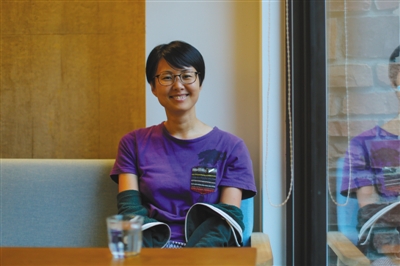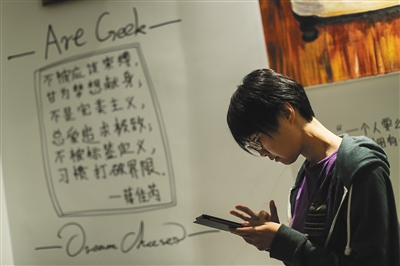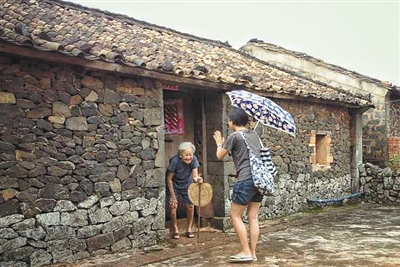


(The Beijing News/Peng Ziyang)
A young Japanese woman who has devoted nearly 10 years to the cause of promoting her government to admit its guilt about China's "comfort women" and spreading historical facts about the group says she will proceed with the job no matter how difficult it is.
A lot of people regard "comfort women" as a proof of history, but few of them care about their mental state—are they happy, do they feel lonely and hurt? Well, Yoneda Mai cares.
The most heartbreaking journey
Mai does part-time jobs in Japan and lives on a very low income. She can barely buy herself new clothes, and most of her money is spent on visiting the seniors in Hainan province, southern China.
The 33-year-old had stayed in the province for three years to help the "comfort women" after she learnt about their stories in 2008. Though she later returned to Japan for health reasons, she still cares about the group and visits them in every summer and winter.
In recent years, her journey to Hainan has gradually become heartbreaking, because the seniors are dying one after another. In this year alone, three former "comfort women" in Hainan passed away.
She was very grieved when Huang Youliang, the last remaining Chinese survivor to file a lawsuit against the Japanese government for her suffering, passed away on August 12.
A different childhood
When she was three years old, Mai began to protest in the streets with her mother, a feminist. She grew up freely and only wanted to go to work upon high school graduation. It was not until she learnt about the Nanjing Massacre that she decided to go to university to study history.
Like Mai, most of the Japanese students barely learn the history about Japan's war crimes, such as the Nanjing Massacre and the "comfort women." Instead, they are taught that Japan is a victim of war.
The unknown knowledge has aroused Mai's curiosity about the war, and her teacher suggested she go to university if she wanted to pursue truth.
Years later, she was admitted by a university and chose international relations as her major. There, she saw classmates from other Asian countries debate heatedly over former Japanese Prime Minister Junichiro Koizumi's visit to the Yasukuni war shrine. At first she was confused, but later felt ashamed for missing such an important part of her country's history.
In 2008, Mai attended a trial in Tokyo when eight "comfort women," including Huang Youliang, sued the Japanese government, demanding an apology. Their stories shocked her, and she decided to do something for them.

(The Beijing News/Peng Ziyang)
Go to China
The first thing she did when she came to Hainan was to join a folk organization called "Hainai Network," founded by a group of Japanese lawyers.
In 2009, the Japanese court rejected the appeals of the "comfort women," claiming that individuals have no right to sue the state. Mai was at the scene when three Japanese lawyers were summoned to announce the results to the senior victims. She saw some of them burst into tears.
Huang, the most persistent one, demanded an apology from the soldiers who had raped and tortured her, even though the Japanese government refused to apologize, Mai recalled.
In 2011, when Mai graduated from university, she came to Hainan to learn Chinese. With the help of a Chinese student, she found out the addresses of all the "comfort women" and has visited them ever since.
Now, she is close to the seniors and knows they are kind, lonely, and sensitive. They've been hurt deeply, but they still treat others nicely, even if they are Japanese.

(The Beijing News/Peng Ziyang)
Do not stop fighting
Apart from regularly visiting the seniors, Mai made a video to record the daily life of a senior and translated the local dialect into Mandarin and Japanese. Over the years, she has displayed photos and videos about the seniors and has held seminars across the world in a bid to raise awareness about the group.
In Japan, she repeatedly tells people that their current life is closely related to history and if they don't learn from and reflect on history, they will repeat the mistakes. But she knows it is hard to change people's attitudes toward "comfort women," especially when that history and the Nanjing Massacre has been left out and witnesses are dying.
Sometimes she even wonders if she, a Japanese person, should visit the Chinese seniors and if her visits will do any good. "I will not stop this cause until the Japanese government apologizes. But if they do not, I will continue to go to China to accompany the seniors and tell them they are not forgotten," she said.
 Fire brigade in Shanghai holds group wedding
Fire brigade in Shanghai holds group wedding Tourists enjoy ice sculptures in Datan Town, north China
Tourists enjoy ice sculptures in Datan Town, north China Sunset scenery of Dayan Pagoda in Xi'an
Sunset scenery of Dayan Pagoda in Xi'an Tourists have fun at scenic spot in Nanlong Town, NW China
Tourists have fun at scenic spot in Nanlong Town, NW China Harbin attracts tourists by making best use of ice in winter
Harbin attracts tourists by making best use of ice in winter In pics: FIS Alpine Ski Women's World Cup Slalom
In pics: FIS Alpine Ski Women's World Cup Slalom Black-necked cranes rest at reservoir in Lhunzhub County, Lhasa
Black-necked cranes rest at reservoir in Lhunzhub County, Lhasa China's FAST telescope will be available to foreign scientists in April
China's FAST telescope will be available to foreign scientists in April "She power" plays indispensable role in poverty alleviation
"She power" plays indispensable role in poverty alleviation Top 10 world news events of People's Daily in 2020
Top 10 world news events of People's Daily in 2020 Top 10 China news events of People's Daily in 2020
Top 10 China news events of People's Daily in 2020 Top 10 media buzzwords of 2020
Top 10 media buzzwords of 2020 Year-ender:10 major tourism stories of 2020
Year-ender:10 major tourism stories of 2020 No interference in Venezuelan issues
No interference in Venezuelan issues
 Biz prepares for trade spat
Biz prepares for trade spat
 Broadcasting Continent
Broadcasting Continent Australia wins Chinese CEOs as US loses
Australia wins Chinese CEOs as US loses